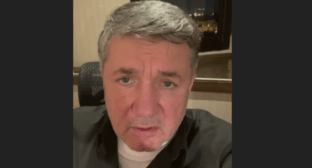28 November 2012, 23:00
ICRC: Nagorno-Karabakh journalists need legal training
Media workers of Nagorno-Karabakh need significant legal training. This was concluded by experts in the sphere of human rights after the seminar in Stepanakert, organized by the mission of the International Committee of the Red Cross (ICRC).
On November 26, the seminar for journalists, engaged in highlighting conflicts, was held under the title "ICRC and media workers: Principles of ICRC's cooperation with media representatives. Ethical and legal standards in highlighting armed conflicts". The seminar demonstrated a documentary film "Panorama-08" about the ICRC's activities in different countries, the "Caucasian Knot" correspondent reports.
Pierre-Emmanuel Ducruet, the head of the Information Support Centre of the Moscow regional delegation of the ICRC spoke about the principles of the ICRC's activities, the works, held in 2012, and the programmes for the following year.
He has also stated that journalists are potential victims of war, and, therefore, they should know their rights and obligations, and those seminars are specifically held for that.
Eteri Musaelyan, a staff member of the Division of Public Relations of the ICRC in Nagorno-Karabakh, provided the information on projects, implemented by the ICRC mission in the region.
In particular, Eteru Musaelyan has noted that in 2008-2011, the ICRC collected in Nagorno-Karabakh the detailed information about the missing persons. According to the information, 419 persons were put on the list of the missing persons.
Then, Eteru Musaelyan spoke of microeconomic projects for the families of missing persons, implemented since 2011. Besides, in Stepanakert and Shusha, the financial support is also being provided for persons in desperate need and elderly persons. The similar programme is also being implemented with regard to families, whose members suffered in explosions of landmines.
Eteru Musaelyan also informed about other projects, being implemented by the ICRC in the region: visits to prisoners of war and inmates of the Shusha prison, restoration of families, and dissemination of knowledge of international humanitarian law among military personnel, students, and journalists.
Inga Avanesyan, a staff member of the psychosocial programme for family members of missing persons, has reported that in 2011, they launched a programme of psychological support for family members of missing persons, and 109 families were affected by the programme.
Seiran Karapetyan, the head of the Russian edition office of the Artsakh Public TV and Radio Company, shared his impressions of the seminar with the "Caucasian Knot" correspondent.
"I very often come in contact with the humanitarian law and with the Red Cross; however, many issues became a discovery for me. Similar seminars are very useful, since we need to know our rights, rights of journalists, working in a conflict area, and to know the principles of the international humanitarian law to apply them in our professional activities," Seiran Karapetyan said.
Meanwhile, he believes that it is necessary that "the other party should also be aware of the principles of the international humanitarian law to make it easier for journalists to work on a legal basis in those areas."
Susanna Balayan, a correspondent of the Karabakh government newspaper "Azat Artsakh", has noted that the journalists learned at the seminar about the many humanitarian projects of the ICRC, and that in the future, a regional project with participation of Karabakh journalists may be organized.
Author: Alvard Grigoryan Source: CK correspondent




